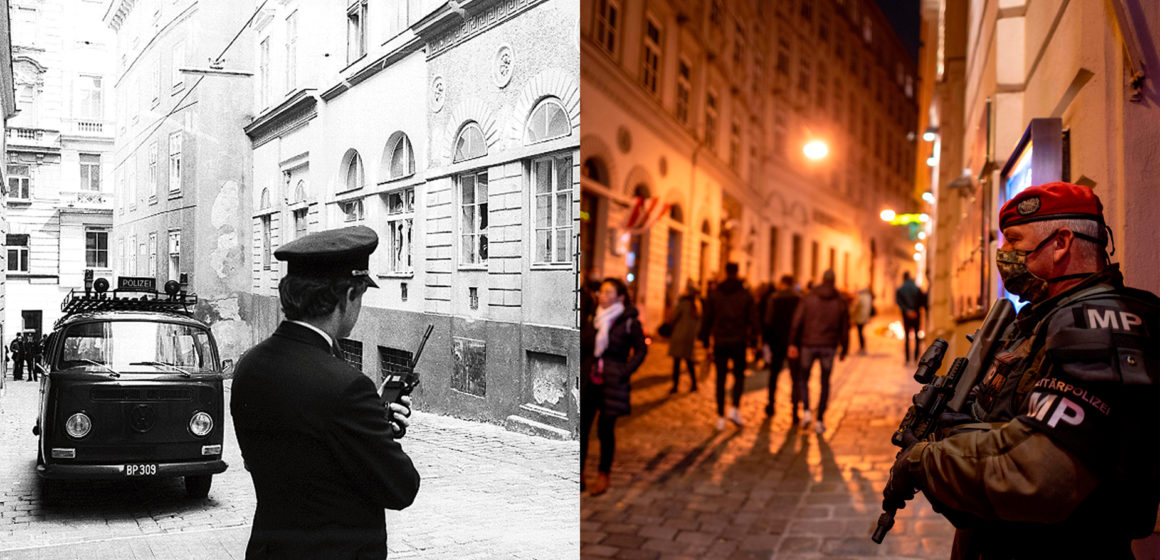On November 2, 2020, the residents of Vienna and the whole world were terrified by the news of a terrorist attack in the heart of Europe. From the perspective of history, you can draw parallels that have left an imprint on the heart of the Austrian capital. In this article, we would like to talk about similar tragic events that happened before in this central part of the city, jokingly nicknamed by the residents as the “Bermuda Triangle”.
Vienna’s first district, the so-called Inner City, is distinguished by an active business and cultural life. There are many sightseeings, architectural monuments, and buildings important for the history of Vienna. One of these places is the main synagogue – Stadttempel, also known as Seitenstettentempel, after the name of the street on which it is located. The construction of the synagogue was carried out in 1825-1826 and was an important event in the life of the Jewish community of the city. The Main Synagogue was the only Jewish religious building in Vienna that was not badly damaged during the Kristallnacht organized by the Nazis in 1938. However, this was not the last act of aggression against the synagogue.
The terrorist act of 1979
On April 22, 1979, there was an explosion in the Stadttempel courtyard. Half a kilo of plastic explosives destroyed all the windows and caused significant damage to the synagogue. Fortunately, there were no visitors in the building at that moment, and no one was hurt. The crime was committed by the “Eagles of the Palestinian Revolution” – an armed extremist group, part of the Al-Saika faction. It was this group that took part in the first terrorist act on the territory of Austria in Marchegg in 1973.
The terrorist act of 1981
On August 29, 1981, the attack on the synagogue was repeated. On that day, a bar mitzvah was celebrated in the temple. Two Palestinian terrorists threw grenades at the courtyard of the temple and started shooting. Thanks to the efforts of the police and security guards, the criminals were quickly detained, but in the course of the attack, 2 people were killed, and 18 more were seriously injured.
It is worth noting that in the early news of this event, it was claimed that there were three attackers. The militants belonged to the Abu Nidal Organization, also known as the Fatah Revolutionary Council. The organization was constantly engaged in terrorist acts directed against the state of Israel. One of the criminals also turned out to be the murderer of Heinz Nittel, president of the League of Austrian-Israeli Friendship. Four years later, the same organization will make a terrorist attack at the Vienna airport.
The terrorist act of 2020
On November 2, 2020, a few hours before the new lockdown came into effect, shots were fired on the same street on which the main synagogue is located. They marked the beginning of the bloodiest act of religious violence in Austria in 35 years. Armed with a machine gun, a knife and a belt with a camouflage of explosives, the terrorist took the lives of four people, 23 people were injured of varying severity. According to official figures, the offender was killed 9 minutes after the police received a signal. The bandit turned out to be a 20-year-old Austrian with Albanian roots, who had already tried to get to Afghanistan and Syria to participate in terrorist organizations and even served his time in an Austrian prison. The terrorist attack was organized by the Islamic extremist organization Islamic State. According to early reports, there were several attackers, but later this version was not confirmed.
On November 3, three days of mourning were declared, the streets of the city center were filled with flowers and candles in memory of the victims. Security has increased in the inner city, and military police are patrolling the streets. Life is slowly returning to normal, leaving a smack of rejection for those trying to put new question marks in the Bermuda Triangle. Austria has coped with the shock and is optimistic about the future.
Also read about how the restrictions related to COVID-19 affect the real estate market in Austria.

